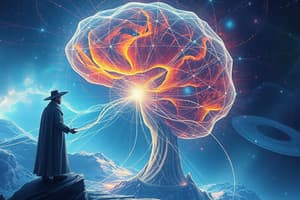Podcast
Questions and Answers
Which factor is NOT associated with the consolidation of autobiographical memories?
Which factor is NOT associated with the consolidation of autobiographical memories?
- Self-relevance
- Timing of the event
- Sleep duration
- Stress level at encoding (correct)
What describes the primary difference between the Standard Model and the Multiple Trace Model of memory consolidation?
What describes the primary difference between the Standard Model and the Multiple Trace Model of memory consolidation?
- The focus on emotional vs. non-emotional memories
- The role of sleep in memory formation
- The reliance on synaptic consolidation vs. systems consolidation
- How memories are stored and retrieved over time (correct)
Which form of memory error is characterized by incorrect recollection of the source of a memory?
Which form of memory error is characterized by incorrect recollection of the source of a memory?
- Familiarity error
- Flashbulb memory
- Source monitoring error (correct)
- Illusory truth effect
Which of the following statements best describes flashbulb memories?
Which of the following statements best describes flashbulb memories?
What is a potential consequence of the weapons focus effect in eyewitness testimony?
What is a potential consequence of the weapons focus effect in eyewitness testimony?
What is the approximate capacity of Short-Term Memory as suggested by the digit span task?
What is the approximate capacity of Short-Term Memory as suggested by the digit span task?
Which component of the Working Memory Model is responsible for rehearsing and storing verbal information?
Which component of the Working Memory Model is responsible for rehearsing and storing verbal information?
What is one way to differentiate between Long-Term Memory and Short-Term Memory?
What is one way to differentiate between Long-Term Memory and Short-Term Memory?
Which type of memory is primarily associated with the skills and tasks we perform automatically?
Which type of memory is primarily associated with the skills and tasks we perform automatically?
What aspect of the phonological loop can be demonstrated through the word length effect?
What aspect of the phonological loop can be demonstrated through the word length effect?
Which of the following is evidence of distinct memory processes between episodic and semantic memory?
Which of the following is evidence of distinct memory processes between episodic and semantic memory?
Which encoding strategy involves creating connections and relevant associations to enhance memory retention?
Which encoding strategy involves creating connections and relevant associations to enhance memory retention?
What is the primary role of the central executive in the Working Memory Model?
What is the primary role of the central executive in the Working Memory Model?
Flashcards are hidden until you start studying
Study Notes
Modal Model of Memory
- Sensory Memory - holds information for a short time (a few seconds) - an echo (auditory) or icon (visual)
- Short-Term Memory - holds information for brief periods (15-30 seconds) - capacity is 5-9 items (digit span tasks)
- Long-Term Memory - holds information for long periods - capacity is large
Working Memory Model
- Working Memory: is different than STM, it holds information actively and manipulates it
- Phonological Loop: processes auditory information through rehearsal - Evidence of phonological similarity effect (similar sounds harder to remember), word length effect (short words easier to remember), and articulatory suppression (speaking prevents rehearsal)
- Visuospatial Sketchpad: processes visual and spatial information - Evidence includes mental rotation tasks and interference caused by other visual stimuli
- Central Executive: controls, coordinates, and manipulates information from the phonological loop and visuospatial sketchpad - also directs attention and manages resources
Long-Term Memory Structure
- Types of Long-Term Memory: explicit and implicit - Explicit (conscious) includes episodic and semantic, Implicit (unconscious) includes procedural, priming, and conditioning
- LTM vs. STM - they are different because of serial position effects (primacy and recency) and neuropsychological evidence like Patient HM (anterograde amnesia - unable to form new memories) and Patient KF (retrograde amnesia - unable to retrieve old memories).
Explicit Memory
- Episodic Memory: personal experiences with contextual details - Patient KC (no episodic memory but has semantic memory) and Patient LP (opposite) are evidence of distinction
- Semantic Memory: general knowledge about the world - both are distinct based on neuropsychological and brain imaging evidence - Episodic details decay faster than semantic details
- Episodic and Semantic Interaction: personal semantic memories (experiences form knowledge), recollection (specific event) vs. familiarity (sense of knowing it without specifics), remember/know procedure (identifies two types of memory retrieval).
Implicit Memory
- Procedural Memory: for skills and procedures
- Priming: Exposure to a stimulus influences the response to a related stimulus - Repeat priming (repeated exposure) and Associative priming (related stimuli enhance)
- Conditioning: Learning associations based on the pairing of stimuli
Encoding
- Levels of Processing Theory: the level of processing during encoding determines memory strength
- Deep Processing: (better memory) - visual imagery, self-reference effect (relating to yourself), generation effect (creating your own examples), organization (grouping related information)
- Study Strategies: Elaboration (adding details), organization (grouping similar information), spacing effect (distribute learning over time), note-taking strategies (active processing), retrieval practice (testing yourself), active vs. passive learning and studying (active is better).
Retrieval
- Cued Recall: retrieving information with clues
- Matched Conditions of Encoding and Retrieval: similar conditions improve recall
- Encoding Specificity: similar retrieval conditions as encoding better.
- State-Dependent Learning: similar internal state at encoding and retrieval.
- Transfer Appropriate Processing: similar processes at encoding and retrieval.
Consolidation
- Memory Fragility: memories are most fragile during consolidation
- Neuroscience of Consolidation:
- Synaptic Consolidation: changes in synapses (strengthening connections)
- Long-Term Potentiation (LTP): a mechanism for strengthening synaptic connections
- Systems Consolidation: shifting from hippocampus (temporary) to other brain regions (permanent)
-
- Standard Model: hippocampus replays memory to consolidate it
-
- Multiple Trace Model: hippocampus stays involved for some episodic memories
-
- Sleep and Consolidation: sleep aids memory by promoting consolidation
- Reconsolidation: retrieving a memory makes it vulnerable to change
Memory Errors
- Autobiographical Memory: memory about personal events - influenced by self-relevance, state of mind (stress can distort), timing of event (reminiscence bump: heightened memory for youth), and emotionality of the event
- Flashbulb Memories: vivid, detailed, and emotionally charged memories of significant events - may be accurate for some details but still susceptible to errors.
- Constructiveness of Memory: we reconstruct memories, leading to errors
- Source Monitoring Errors: misattributing the source of a memory
- Illusory Truth Effect: repeated exposure to a statement increases belief in its truthfulness
- Misinformation Effect: inaccurate information introduced after an event can distort original memory
- Familiarity Error: confusing familiarity with knowledge
- False Memories: reconstructing memories influenced by schemas (knowledge of patterns) and scripts (sequence of events).
- Legal Implications: memory errors have legal implications
- Eyewitness Testimony: can be unreliable, influenced by the person's belief
- Weapons Focus Effect: attention to a weapon can reduce recall of other details
- Errors Due to Suggestion: questions and leading statements from authority can influence recall, leading to false confessions.
Studying That Suits You
Use AI to generate personalized quizzes and flashcards to suit your learning preferences.




